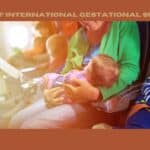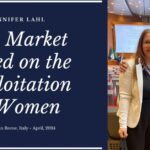Dear Friend,
As each year draws to an end, I like to look back and take stock of all that your generous support has allowed us to accomplish here at the Center for Bioethics and Culture. Looking back this year, I can’t believe all that we’ve done (and the miles I’ve flown!).
Early in the year we hosted a Stop Surrogacy Now event in New York around the annual U.N. Commission on the Status of Women gathering. The event itself was an overwhelming success, with a standing room only crowd packed in during a major NYC snowstorm. The next day, I was privileged to speak in the ECOSOC Chamber inside the United Nations Headquarters, urging those gathered to “Stop this Global Trading on the Female Body!”
Soon after, we brought an international team of experts on the business and ethics of surrogacy to speak in Madrid, Spain. Over the course of several days, we met with representatives from each of the political parties in the Spanish Parliament, we hosted a public screening of our film Breeders: A Subclass of Women?, and we conducted numerous interviews with Spanish and European television, radio, newspaper, and online outlets.
Our goals for this trip to Spain were straightforward: to provide education and information about surrogacy, to encourage the Spanish to keep surrogacy illegal in their country, and to encourage them to enact laws so that Spanish couples cannot travel abroad to rent wombs and buy babies.
In New York, in Spain, and over the course of the summer, Matthew and I were in production on a new, feature-length documentary film, exploring the story of a surrogate named Kelly. She was lied to, lied about, nearly died, and left in all but financial ruin.
The infertility industry likes to brush off the stories we highlight in our work as merely anecdotal and rare cases, but we are, year-by-year, documenting case after case after case of women, children, families, and others harmed by the actions, the inactions, and, frankly, the deceptions of the infertility industry.
Currently, we’re in the post-production phase of the film. We desperately need to raise the budget to edit and market is so that we can finish and distribute this important new film.
In addition, your generous support this year has allowed both Matthew and me to participate in countless interviews and write on a wide range of bioethics issues. For example, this year I coauthored a ground-breaking article in Reproductive Biomedicine Online calling for an egg-donor registry so that we can finally determine what the long-term health consequences of the egg donation process are.
I also had a chapter published by Cambridge University Press detailing the shape of surrogacy in the United States. Matthew addressed artificial wombs, euthanasia, gene editing, portrayals of bioethics in popular culture, and more in his writing.
This year we have also released two e-books that add much-needed perspective to the ethical consideration of third-party reproduction. In March, we published an interview with “Sandra,” who has two sons, one of whom was born through egg donation. That book is entitled, Not Just Creating Your Own Family. In August, we published Kevin’s account of serving as a sperm donor for friends, and the pain that has followed in the wake of that decision. His book is I’m a Sperm Donor Father: Here’s My Story.
Taking stock like this helps me put our work in perspective too. This has been a difficult year for me. I’ve fought discouragement, disappointment, and burnout. The weight of the issues we address is sometimes quite heavy.
Many people simply don’t understand why we do this work. The short answer is, we feel called to do this very work. Hardly anyone else is addressing the issues of egg donation, surrogacy, and sperm donation.
Allow me to share with you some encouragement I received recently that meant a great deal to me. I trust it will encourage you as we partner together in this vitally important work.
 Robert George, whom many of you will know from his work as McCormick Professor of Jurisprudence at Princeton University and/or from his time as a member of the President’s Council on Bioethics, shared on Facebook an interview I conducted with an egg donor named Leah. In introducing the interview, Prof. George wrote:
Robert George, whom many of you will know from his work as McCormick Professor of Jurisprudence at Princeton University and/or from his time as a member of the President’s Council on Bioethics, shared on Facebook an interview I conducted with an egg donor named Leah. In introducing the interview, Prof. George wrote:
Jennifer Lahl is one of my heroes. There are lots of phony “women’s advocates” around. Jennifer is the real deal. The kind of women’s advocacy she does requires enormous dedication—and courage. Powerful interests that profit handsomely from the exploitation of egg donors, surrogate mothers, and others would like to shut Jennifer down. But they’ve met their match in her.
As soon as I saw his post, I commented:
WOW. I feel so unworthy and inadequate, but my language of love is words of encouragement. So I’ll run with this. Thank you Robert for your kind words.
He quickly responded, adding:
I’m so grateful for your work and witness, Jennifer. I love the fact that you refuse to let your adversaries frighten or intimidate you. What we need above all these days is courage—and people who model that virtue. You do that.
Our work certainly requires both enormous dedication and courage. We get our fair share of intimidation. With your financial help now and into the new year, we will keep telling the stories and keep bearing witness to the truth. We won’t back down!
Sincerely,
Jennifer
PS: As Professor George wrote, we are up against powerful interests that profit handsomely from their exploitative work. We truly need your financial help to continue to stand courageously against them.

The Center for Bioethics and Culture is a non-profit 501(c)(3) public benefit educational organization. All gifts are tax-deductible.
Author Profile

- Jennifer Lahl, MA, BSN, RN, is founder and president of The Center for Bioethics and Culture Network. Lahl couples her 25 years of experience as a pediatric critical care nurse, a hospital administrator, and a senior-level nursing manager with a deep passion to speak for those who have no voice. Lahl’s writings have appeared in various publications including Cambridge University Press, the San Francisco Chronicle, the Dallas Morning News, and the American Journal of Bioethics. As a field expert, she is routinely interviewed on radio and television including ABC, CBS, PBS, and NPR. She is also called upon to speak alongside lawmakers and members of the scientific community, even being invited to speak to members of the European Parliament in Brussels to address issues of egg trafficking; she has three times addressed the United Nations during the Commission on the Status of Women on egg and womb trafficking.
Latest entries
 infertilityApril 23, 2024The Rise of International Gestational Surrogacy in the U.S.
infertilityApril 23, 2024The Rise of International Gestational Surrogacy in the U.S. Assisted Reproductive TechnologyApril 16, 2024Founder Jennifer Lahl’s Speech on Surrogacy to the Casablanca Declaration
Assisted Reproductive TechnologyApril 16, 2024Founder Jennifer Lahl’s Speech on Surrogacy to the Casablanca Declaration #BigFertilityFebruary 27, 2024No, Alabama Didn’t Ban IVF
#BigFertilityFebruary 27, 2024No, Alabama Didn’t Ban IVF ArticleSeptember 25, 2023The Little Engine That Could
ArticleSeptember 25, 2023The Little Engine That Could



